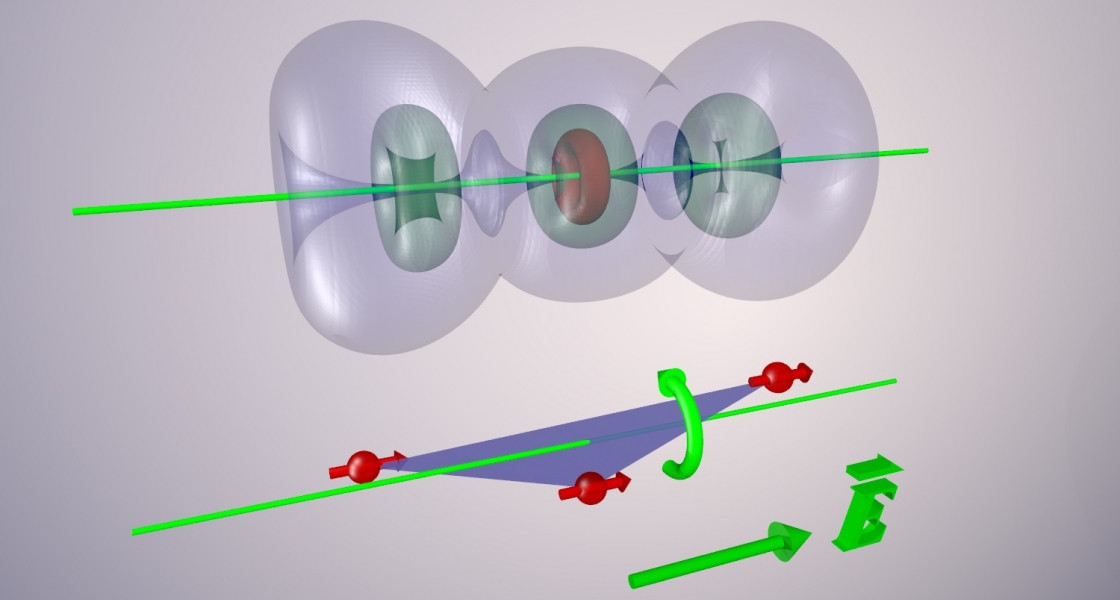The Greene group has just discovered some weird quantum states of ultracold fermions that are also dipoles. Dipoles are particles with small positively and negatively charged ends. Atoms (or molecules) that are fermions cannot occupy the same quantum state — unlike the neighborly bosons that readily occupy the same state and form Bose-Einstein condensates at ultracold temperatures. The new theoretical study was interesting because it explored what would happen to dipolar fermions under the same conditions that cause dipolar bosons to form infinitely many three-atom molecules even though no two bosons ever form a molecule under these conditions!
The physics underlying the formation of the triatomic molecules is called Efimov physics after Russian theoretical physicist Vitaly Efimov, who predicted the strange states in 1970. The Greene group has made major contributions to the study of Efimov physics since the 1990s, including those described in Laws of Attraction and Rave Reviews for the Efimov Quartet. The new study is the first to investigate what would happen to dipolar fermions under the same conditions that cause dipolar bosons to form triatomic Efimov molecules. The study was performed by research associate Yujun Wang, senior research associate Jose D’Incao, and Fellow Chris Greene.
What the researchers found was that three dipolar fermions should not form an Efimov state. However, as the attraction among the dipolar fermions reached the magic point where an Efimov state would have formed with bosons, the fermions formed only one kind of triangular molecule, the one shown in the picture. This picture appeared on the cover of Physical Review Letters the week ending with Dec. 2, 2011.
This triangular cluster always had the same shape —unlike a true Efimov state in which the three particles can have almost any configuration. However, as with the previously studied Efimov states, the attraction between the dipolar fermions could be completely controlled by changing the strength of the electric field around them. Interestingly, the ability to form the single triangular molecule by changing the electric field only worked for dipolar fermions. Nonpolar fermions didn’t exhibit anything remotely resembling the Efimov effect.
Wang and his colleagues predict that fermions with stronger dipoles will lead to longer-lived bound states (molecules). Thus, their new results may be useful to experimentalists. The long lifetime makes it easier to manipulate the new triangular-shaped molecules in the laboratory.
The team also found that two dipolar fermions could form a bound state and create an even more stable molecule. This relatively long-lived particle could act as a sort of stabilizer in delicate experiments with ultracold gases. — Stephanie Chasteen



 The Physics Frontiers Centers (PFC) program supports university-based centers and institutes where the collective efforts of a larger group of individuals can enable transformational advances in the most promising research areas. The program is designed to foster major breakthroughs at the intellectual frontiers of physics by providing needed resources such as combinations of talents, skills, disciplines, and/or specialized infrastructure, not usually available to individual investigators or small groups, in an environment in which the collective efforts of the larger group can be shown to be seminal to promoting significant progress in the science and the education of students. PFCs also include creative, substantive activities aimed at enhancing education, broadening participation of traditionally underrepresented groups, and outreach to the scientific community and general public.
The Physics Frontiers Centers (PFC) program supports university-based centers and institutes where the collective efforts of a larger group of individuals can enable transformational advances in the most promising research areas. The program is designed to foster major breakthroughs at the intellectual frontiers of physics by providing needed resources such as combinations of talents, skills, disciplines, and/or specialized infrastructure, not usually available to individual investigators or small groups, in an environment in which the collective efforts of the larger group can be shown to be seminal to promoting significant progress in the science and the education of students. PFCs also include creative, substantive activities aimed at enhancing education, broadening participation of traditionally underrepresented groups, and outreach to the scientific community and general public.